Friday, August 29, 2008
Click your mouse, help an alum (and Peru, too)
Coprodeli USA has submitted a proposal to the American Express Members Project for the opportunity to win $1MM! In total, they are giving $2.5 MM to the top 5 projects. Our funds will be used to construct a Center for Social Services in Ica, Peru and benefit 31,600 people through the services it will provide in education, health, and community support.
WE NEED YOUR VOTES! Of the 800 projects submitted, only the top 25 will go on for a second round of voting. You have until September 1 to help us make the next round - this is your chance to make a big difference!
VOTE HERE for Center For Social Services (CSS) in Peru:
http://www.membersproject.com/project/view/MU3BXJ
VOTING TIPS: 1. Click on the Link Above
2. When the screen appears, if you are a cardholder click on the Log In box in the upper right hand corner of the screen that says American ExpressR Cardmembers: http://www.membersproject.com/images/buttons/btn_login.gif
3. If you are not a cardholder, look for a box that contains the following Not a cardmember? Be our guest.and click on the link that says Guest member sign-up.
4. After you fill in the required information (According to customer service American Express will not use your email for marketing purposes or to send you promotional material. Your email address will be destroyed from their records after the voting process is complete.) you will be brought back to the screen describing the Center for Social Services (CSS) in Peru. Click on the box that says Nominate This Project under the heading
http://www.membersproject.com/images/hdrs/hdr_shouldpro.gif
5. If you are not redirected to the page describing the Center for Social Services (CSS) in Peru after you fill in the required sign-up information, type in Center for Social Services in the search box and it will bring up the page for you. Click on the box that says Nominate This Project under the heading listed in #4.
Thursday, August 28, 2008
Idealist Job Fair: PDX and SEA
To register (it's free for jobseekers), and for more details including schedule, directions,
and a list of registered organizations, please go to: http://www.idealist.org/fairs and
scroll down to click on either "Portland” or “Seattle”.
Please note that not all organizations at the fair will have job openings on that day. Some
will have jobs, while others will have internships and volunteer opportunities. Our
nonprofit career fairs are a place for everyone who wants to make a difference in the world
(including recent undergraduate or grad school students, experienced nonprofit
professionals, and those wishing to transition to a nonprofit career from other sectors) and
we encourage you to consider the wide range of opportunities to move forward in your
nonprofit career.
This year our national series of nonprofit career fairs is generously sponsored by NYU's
Robert F. Wagner Graduate School of Public Service (http://wagner.nyu.edu) and also by
Commongood Careers (http://www.commongoodcareers.com).
I would also like to invite you to take a look at two free books that can help you or other
people you know find a nonprofit job.
The Idealist Guide to Nonprofit Careers for First-time Job Seekers and The Idealist Guide
to Nonprofit Careers for Sector Switchers are both available to download for free at:
http://www.idealist.org/en/career/guide/index.html
If you want to get a sense of what these books look like, and what topics they cover, we
have a short video for you:
http://www.youtube.com/watch?v=6bJ7Cq9WkI4
We hope to see you at the fair!
All the best,
Joe Grant
1220 SW Morrison Street, Suite 1000
Portland, OR 97205
Coordinator, Nonprofit HR Program
Idealist.org - Action Without Borders
http://www.idealist.org
Wednesday, August 27, 2008
Reminder: Fall internships with Congressman Smith
Fall Internships Available with Congressman Adam Smith's campaign
Adam Smith for Congress is seeking out talented, intelligent, and dedicated interns for the summer and fall. Minimum number of hours are 10 per weeks and there is an option for class credit. Duties would include, but not limited to
* Assisting the Political Director and/or the Field Organizer in day-to-day duties
* Recruiting volunteers
* Organizing and working with volunteers to contact voters
* Representing the campaign at political events and meetings
* Assist with fundraising and other events, including events with the candidate
If you are interested, please contact Alex Raposo at alex.w.raposo@gmail.com
Sam Kussin-Shoptaw '09 blogs the Democratic convention
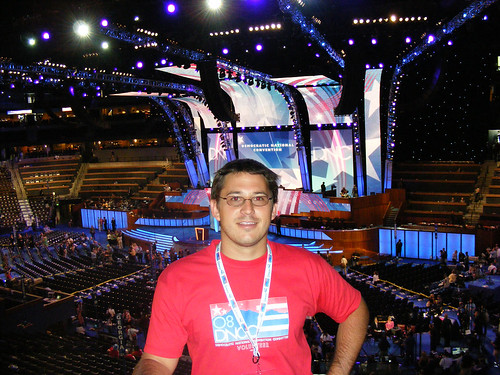
Sam Kussin-Shoptaw '09 is working and blogging the Democratic convention in Denver. Excerpt:
Tonight our section was full at 3:40 PM which meant for almost 6 hours I turned away people of significant power while they lobbied to try and get inside and see the speakers. I would like to apologize to the family of Martin Luther King and state for the record I am a huge fan of the man and his legacy. I wish that I would have found a place for MLK III to sit but we sincerely were full...
Read more here; pictures here.
Tuesday, August 26, 2008
Intern with Rep Norm Dicks
Internship, Norm Dicks for Congress
Congressman Norm Dicks’ campaign is seeking ambitious, energetic interns to help reelect Congressman Dicks, Governor Christine Gregoire and other Democrats. Our campaign puts heavy emphasis on voter outreach and runs a very grassroots campaign. Our office is in Downtown Tacoma and is the hub for the Obama/Democratic campaigns in the Pierce County area. Duties will include:
* Assistance with day-to-day campaign operations
* Voter and constituent outreach through canvassing and calling
* Event planning and coordination
* Database-building
Qualifications:
* Those seeking a fun few months of rewarding work with a seasoned congressional staff, in an atmosphere in which creative and critical thinking is promoted and listened to, are encouraged to apply (internship may count towards class credit).
* Interest or experience in community advocacy, politics, or public service is a plus.
Scheduling will be flexible, though interns are required to work at least 1-2 days a week. We are looking for students that can help us out through the November 4th election date.
Contact:
Hart Edmonson
hart@normdicks.com
Campaign Manager, Norm Dicks for Congress
Hart L. Edmonson
Campaign Manager
Norm Dicks for Congress
Hart@normdicks.com
253-683-4196
Monday, August 25, 2008
Earn $ working on the state gov race
Want to earn $10/hour while helping to get Dino Rossi and other great candidates elected?
The King County Republican Party seeks PAID field staff to canvass for Dino Rossi's and other campaigns!
* Earn $10/hour, up to 15 hours per weekend
* Support the Republican Party in a grassroots fashion
* Meet up and network with like-minded young conservatives from across Pierce and King Counties
* Identify supporters of the cause
* Earn the experience of working on a political campaign during this insanely close election
The 2008 Gubernatorial Election is a rematch of the 2004 campaign. The last cycle was decided by an infinitesimal 129 votes, out of the 2.8 million votes cast statewide- a margin of one two-hundredth of one percent. As we saw four years ago, elections are decided not in polls, but in Election Day turnout. Every vote counts, and making this face-to-face contact is essential to victory in November.
If you're interested, please give me a call at 415-259-9684; we'd love to hear from you!
--
Dan Anderson
415-259-9684
Student loans and spending
MOST people struggling to pay off their student loans keep quiet about it. They do not want to acknowledge that, perhaps in a fit of naïve, youthful optimism, they borrowed more than they could handle.
Then there is Alan Collinge, who for years has described his struggle with tens of thousands of dollars in student loan debt to anyone who will listen. He has appeared on “60 Minutes” criticizing Sallie Mae, the nation’s largest student lender, and has been quoted in the pages of this and other newspapers attacking loan companies.
http://www.nytimes.com/2008/08/24/business/24loans.html
And from the Wall Street Journal, a good piece on how students can budget more effectively:
http://online.wsj.com/article/SB121953468678666683.html
Rankings
http://colleges.usnews.rankingsandreviews.com/college/items/3797
And in the Princeton Review, we are listed among the top 20 for least religious students and most accessible professors.
http://www.princetonreview.com/schools/college/CollegeBasics.aspx?iid=1023493
Friday, August 22, 2008
Library fines, jail time
Woman cuffed, booked for not paying library fines
GRAFTON, Wis. (AP) — A Wisconsin woman has been arrested and booked for failing to pay her library fines.
Twenty-year-old Heidi Dalibor told the News Graphic in Cedarburg that she ignored the library's calls and letters as well as a notice to appear in court.
Still, she was surprised when officers with a warrant knocked on her door, cuffed her and took her to the police station to be fingerprinted and photographed.
Police Capt. Joe Gabrish says officers follow the same procedure with every warrant.
Library director John Hanson says a couple of dozen people are cited each year for failure to return materials or pay fines.
The incident cost Dalibor about $30 for the two overdue paperbacks. It cost her mother $172 to free her.
Freshmen and Ipods=learning?
When it gets a little boring, I might pull it out,” acknowledged Naomi J. Pugh, a first-year student at Freed-Hardeman University in Henderson, Tenn., referring to her new iPod Touch, which can connect to the Internet over a campus wireless network. She speculated that professors might try harder to make classes interesting if they were competing with the devices.
And I might toss your Ipod out the window. Check out the comments on the article online--pretty interesting range of responses.
Thursday, August 21, 2008
Ali Lapp (Weise) '96 moves on in DC
Alixandria Lapp joined Parven Pomper Strategies as Vice President in January of 2008. Lapp brings a unique blend of top-level political experience, having been at the epicenter of the Democratic takeover of the House in 2006, and legislative experience, having spent nearly a decade on Capitol Hill as a top advisor to moderate House Democrats.
Prior to joining PPS, Alixandria Lapp served as Executive Director of NDN, a progressive think tank and advocacy organization. During her tenure, she worked extensively on the organization’s Globalization Initiative, immigration reform, and next-generation media and technology tools.
Read more here.
Tags:
Wednesday, August 20, 2008
Erik Connell '07 Peace Corps Swaziland recap
Sanibonani bekunene,
That means hello everyone in SiSwati, the local language in Swaziland. Technically it means hello people of the right hand, but hey, that's how they greet there.
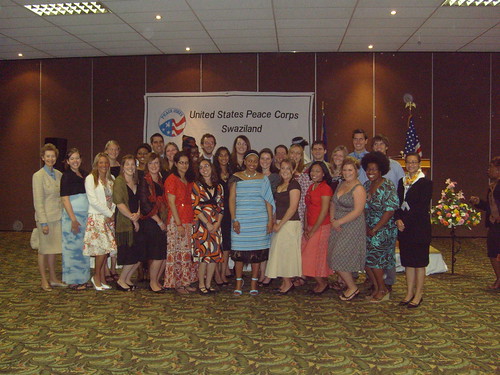
I'm back home now, after spending 13 months there. I resigned due to health concerns combined with the fact that I was not doing as much as I had hoped in the program. It was a tough decision, but I think it was for the best.
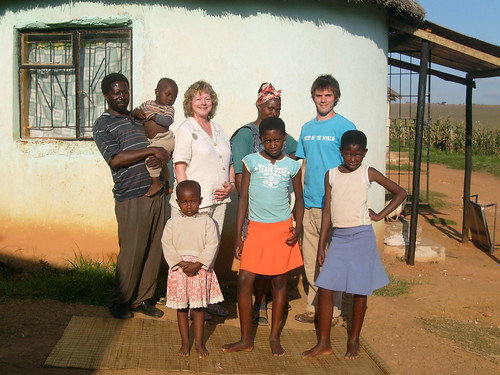
Swaziland was an interesting country to live in; far different than anywhere I've ever been before. It certainly has its share of trouble, with the world's highest HIV/AIDS and TB rates, as well as the fact that 69% of Swazis live on less than US$1 per day (coincidently, around 70% of the country is rural). There was a lot of good there, too, though. Swazis are generally genuinely good people. They're very helpful, and giving, even when they have very little. The main staple of their diet is corn porridge, which they call maize. Some families eat it for every meal. The majority of rural Swazis grow corn.
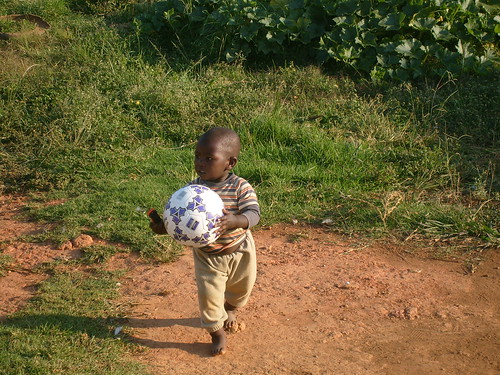
Since this is the long version, I'll start at the beginning. Training lasted 9 weeks, and mainly focused on language and culture, with some medical, safety, and programming (how to do our jobs, HIV/AIDS community health worker). We stayed with host families during training, close to a town in the south of the country called Nhlangano. I stayed with a Dlamini family, which is the surname of the royal family. It is by far the most common last name in the country, comprising over 10% of the country, I've heard. This is because kings generally have many, many children. The previous king, Sobuza II had 210 children from 70 wives. The current king, Mswati III, has a "paltry" 22 children from 12 wives, although he's only 40, so he's still got a few years to catch up. My host family gave me the Swazi name Sibusiso, which means "blessing." Each volunteer got a Swazi name, as not all Swazis were able to pronounce our English names. Mine was especially difficult due to the fact that there are no r's in SiSwati.
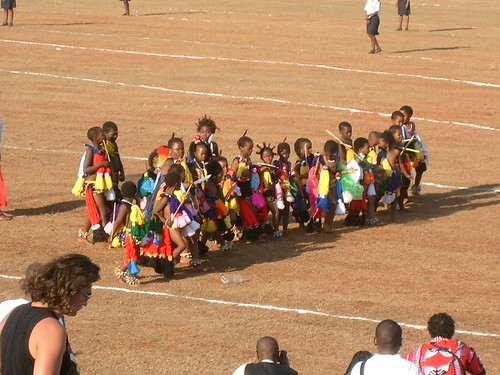
My group was the 5th Peace Corps group to come to Swaziland under the new HIV/AIDS program. There was an education program there a couple decades ago. Originally there were 25 volunteers in my group, 20 girls and 5 guys (sucks for the girls, huh?). We all made it to swear-in in August (a first for this particular program), but 5 of the girls (and I) have since left, for various reasons. Three did not feel safe at site (one was constantly harassed by drunk men at site, another heard a rumor that people in her community had tried to poison the previous volunteer at her site, and the other had a neighbor who was hacked up, a grandmother, with the police report concluding that it was caused by spirits). One had family issues back home and wanted to be there. The other one developed back problems and was unable to move very well, so she was medically separated.
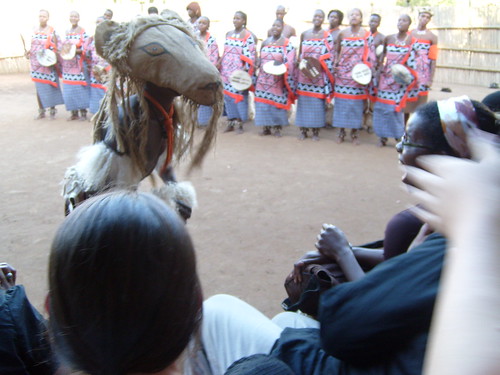
Probably the most interesting story from training was the time my group went to visit a traditional healer, or sangoma. There are two types of traditional healers in Swaziland: inyangas and sangomas. Inyangas are more healers; they use herbs and other natural remedies to help sick people. Sangomas are more like what people would think of when they think of witch doctors: they provide services such as fortune telling, finding lost items, freeing people from curses, and the like. The first thing my group did when we got to the sangoma's homestead was to hide things for her to find. Probably a little under half of our group hid something for her to find, the most common item being candy. When she came out, her assistants proceeded to play drums and shake makeshift rattles, and she went into a trance. While in a trance, she spoke in a much deeper voice, and kneeled down and bounced a lot. She was also quite confrontational and angry. It was a little intimidating. At one point in her act she took off her shirt, which was pretty rough on us Americans, considering she was a rather large and old woman (breasts are not considered a sexual body part in Swaziland). Eventually she started telling us who had hidden things, but it was obvious she was guessing. She got about half of her guesses right. When it was over she stormed off to her hut, and one of her assistants informed us that she felt insulted by our group. She said that candy was for children, and that we should have hid meat (how exactly we were supposed to know that was unclear). She also said that we didn't take her seriously, which was true, but I would say that we hid it well, and did our best to be respectful. She refused to read our fortunes, which she had previously agreed to.
Eventually, after much convincing by Swazi Peace Corps staff, she agreed to read one of our fortunes, provided that we did it topless, to prove that we were taking it seriously. Another volunteer, Brett, and I offered to do it, as we were guys, but one of the girls in our group, Meredith, insisted on doing it. Luckily, they let her put on a lihiya, a traditional Swazi piece of cloth (which is very versatile, by the way, it can be a top, a bottom, both, a head wrap, and many other things). The sangoma came out, still in a trance, and went through a whole act in her deep, menacing voice, then started in on Meredith. She had a mini-feather duster in one hand and a butter knife in the other, and proceeded to dust and poke at Meredith, periodically sticking her head in Mer's chest and crotch. This went on for a while, until finally she revealed her amazing fortune: that sometimes Meredith gets headaches, sometimes she gets stomachaches, and sometimes she gets gassy. Pretty lame. Then she came out of her trance, and we had a Q&A session through a translator. During this session, she was asked if she can cure AIDS, to which she replied that she can, but everyone who has come to her with the disease has come to her too late to be cured. She also made the claim that AIDS is caused by contraceptives. Afterwards, during the debrief, I suggested to the Peace Corps that no American taxpayer money ever go to this woman again.
After training was finished, we were all sworn as official Peace Corps Volunteers at the Royal Swazi Sun Hotel, the nicest hotel in the country. One of the king's wives, as well as several heads of NGOs, were in attendance. The food was spectacular, and the place was lovely.
When it was time for us to go to our permanent sites, they tried to put me at a place called Lushikishini, but I did not feel safe there. The previous volunteer had been robbed by the host family, transportation was not always available, and there were rumors that one of the men on the homestead had held up a khombi (a 15-seater van used for public transportation, quite common in Swaziland). So the Peace Corps moved me to a place called Nsangwini (which translates to marijuana, by the way), which is southeast of Mankayane, if you want to try and locate it on a map. It was the most rural area occupied by a volunteer in Swaziland, 3+ hours by bus away from a bigger town, depending on how crowded the bus was, how many times the bus broke down on the way, and the weather. It was also the only site without cell phone reception at the homestead. I had to walk up a hill for 10-15 minutes to get reception. Finally, it was one of few homesteads without electricity. I did luck out with my host family, though. They were incredibly nice and welcoming people. Not everyone liked, or even really talked to, their host family, but I got along great with mine. The dad on the homestead was Sipho Maseko (k's are pronounced as g's in SiSwati), who was a veterinary assistant. That meant that he was in charge of dip tanks for cattle in the area. He essentially made cows walk the plank into large tanks filled with chemicals. Swaziland was paranoid about cow disease, as a large chunk of their country was quarantined several years back due to foot and mouth disease. That part was taken by South Africa, and never returned. Swaziland is fighting to get it back in international court, but there is little chance of this happening.
Back to my host family. The mom on the homestead was named Gcebile (c's are clicks in SiSwati). She took care of the kids, but she wants to become a government driver (such as an ambulance driver) after all of the kids start school. The children were Qondile, 13 (q's are also clicks in SiSwati), Noxolo (x's are also clicks in SiSwati), 11, Teyise, 5, and Sihlanguseyise, 1. The last was the only boy. The first two attended primary (elementary) school, and the latter two were not in school yet, although Teyise will start next year. The mom and dad on the homestay both spoke good English, so I was able to get to know both of them pretty well. They were definitely an interesting mix of modern and traditional, as were most Swazis. When I would have a friend spend the night who was a girl, they would have no problem with the fact that a guy and a girl were sleeping in the same room, but after the friend would leave, Sipho would always ask me if I was going to marry her.
I lived in what is known as a rondevaal (round house), with a thatch (grass) roof. Many other volunteers had corrugated iron (tin) roofs, which kept the house hot in the summer and cold in the winter, so I was actually happy to have a grass roof. A lot of people have asked what I ate there. I had a gas stove, so I pretty much ate whatever I could cook on that. They had grocery stores in town, so I would just buy food there and take it back home. At first my room was pretty empty, with just a bed and a table left over from the previous volunteer, but I added a lot to it. I bought a kitchen unit and a wardrobe in town. I had a local carpenter make me two bookshelves (one for cooking instruments), some drawers, and a coffee table (the coffee table took about 6 months, though, which was ridiculous). I also bought a couch in town, which I got home by putting it on top of my bus. I saved a lot on delivery that way.
During the first three months as official volunteers, we were in a period known as "lockdown," where we weren't allowed to spend the night away from our respective sites, and we were not supposed to start any real work. Instead, we were to integrate into our communities and use a few of the "tools" they gave us to do so. One of these was called the homestead census, where we went to different homesteads in our community and asked them a series of questions about how their lives were, and what they thought were some problems in the community. Another was a survey a fellow volunteer and I did at our local high school (called Ekuphakameni Central High School) of students' knowledge of, and attitudes towards, HIV/AIDS. There was also a daily clock for students, so we could find out what a typical day was like for them. I also did one activity where I found out about all of the different projects going on in my community. Finally, I did one where I listed all of the different people and organizations that were active in my community.
After lockdown, I was finally free to start doing projects. One thing I did on a fairly consistent basis was I had a boys club at the high school. I taught them life skills, such as how to put on a condom, and general info about HIV/AIDS. We also hung out and had fun sometimes. They were really into volleyball. I taught them how to throw an American football, which was really fun, and funny. They all thought it was a rugby ball at first. The project we did that I was most proud of was when they started a petition to take back the local youth center, which was a place kids could hang out after school. The local government was using it to store food aid, so kids could not use it. It took a long time, but eventually the food was removed.
I also taught at the high school a number of times. I taught life skills, which was mainly related to HIV/AIDS. I taught them basic HIV/AIDS info, how to use male and female condoms, and also engaged in dialogue with them about HIV/AIDS. Classes there are all lecture, so they appreciated getting a chance to give their opinions on why HIV/AIDS is so prevalent in Swaziland, and what can be done to stop the pandemic.
A couple months after the end of lockdown, I held my first workshop in my chiefdom. I provided food (funded by PEPFAR, the President's Emergency Plan for AIDS Relief), and gave out a free UNICEF calendar as a gift, so a lot of people came. Officially 68 people signed in, but the real number was probably closer to 100. I had Population Services International (PSI) came to talk about condom use and the importance of testing for HIV/AIDS. They also tested 20 people for HIV. The Ministry of Health came and talked about prevention of mother to child transmission of HIV/AIDS. The Family Life Association discussed male circumcision (which is quite effective in preventing infection). Finally, I had a local drama group do a skit about the importance of family in the fight against AIDS. Overall, the event went really well!
PSI came back a few months later to do another event. Since I didn't provide food, it was far smaller, but still very worthwhile. Their main purpose was to do HIV testing, but they also talked about condom use again, and did demonstrations with both male and female condoms. In addition to this, they talked about a de-worming tablet they had, and sold a few (don't worry, it was very cheap, less than US 50 cents). They also gave away several boxes of condoms, which was a victory in itself in a country notorious for not using condoms. At the end of the day, 17 people tested, so I was happy.
One of the projects I did in my community that I am very proud of was to introduce condoms into my chiefdom. I went to an organization called the Mbabane Public Health Unit and picked up boxes of both male and female condoms for 13 different structures in my chiefdom. I distributed them to 3 shops, 3 neighborhood care points (where orphans and vulnerable children are fed, the community had meetings at these places sometimes), 2 markets, my kagogo center (started by NERCHA, a national organization, to combat AIDS, there's one kagogo center in every chiefdom), the local high school, the inkhundla (like a county office), a spaza phone (like a pay phone, but there's an actual little shack with an attendant), and the youth center. When I returned from picking up the condoms, my homestay mom asked me if she could have some for herself. At that moment I knew the aforementioned workshops had gotten through to people!
For my Christmas holiday, I met up with my friend Jen in Maputo, Mozambique. She had just finished a semester abroad in Tanzania. We visited a few museums, but mostly we just hung out on the beach. Swaziland is landlocked, so I was great to see a beach again.
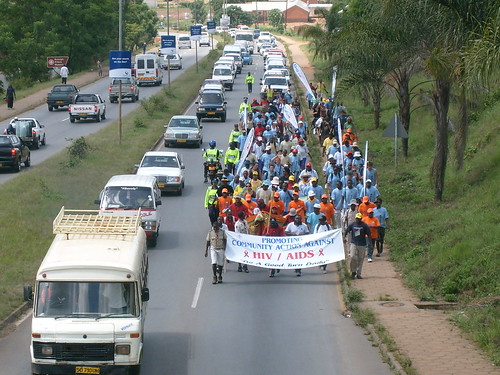
One of the more remarkable experiences of my time in the Peace Corps came this March when I, as well as around 120 other people (about 30 of which were other volunteers), walked across the country. It was about 127 miles and it took us 12 days to do. It was mainly organized by Peace Corps volunteers, with some help from UNICEF and NERCHA. We called it Walk the Nation, and the goal was to raise awareness of HIV/AIDS issues in rural communities. Each day we stopped at a different location to have an event, mostly at schools. At these events we had speakers, free testing, and skits on HIV/AIDS by a Red Cross drama group that was traveling with us. An HIV educator from Dallas-Ft. Worth named Judith Dillard flew all the way out to Swaziland to walk with us. It turns out Dallas-Ft Worth is a sister city to the capital city of Swaziland, Mbabane. Judith has been living with HIV for 18 years. She was a great speaker, and I thought it was great for Swazis to see someone who was open about their status, as so many Swazis are ashamed to admit they are positive due to stigma. Often when someone dies of AIDS there, the family members will lie about the cause of death and just say the person died of a headache or something. The walk was a success. Other NGO's even started holding walks of their own. It was funny because they also called them "Walk the Nation," like our event, but their walks would only last a day. Many Swazis still struggle with the English language.
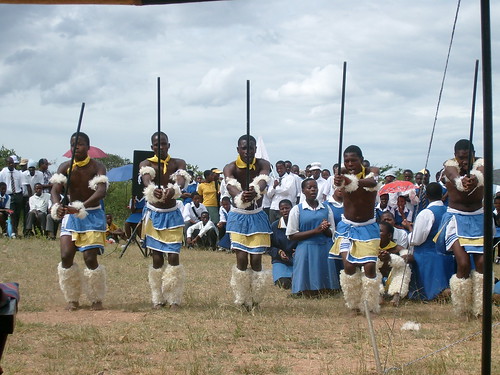
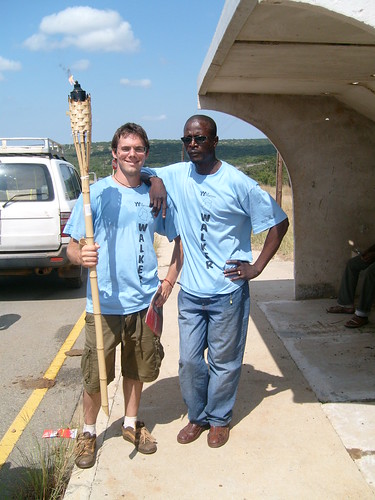
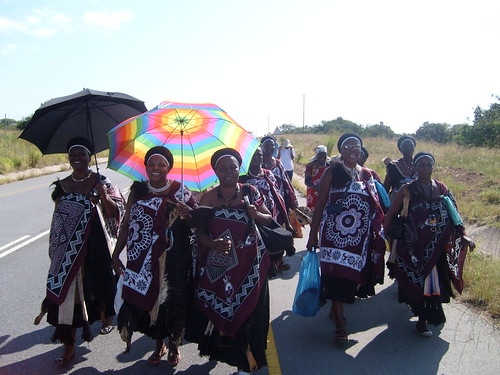
Another project I worked on while I was there was a bee-keeping project that was started by the previous volunteer at my site, Justine. I helped a group of entrepreneurs in my community, who called themselves Buhle Bemaswati, attain the funds to start a small bee-keeping business. They got all of the equipment necessary through a group called Swaziland Charitable Trust. I also helped them further their knowledge of bee-keeping by finding information on it and giving it to them. Honey was named the number one opportunity for small businesses in Swaziland by a business-oriented NGO called Technoserve, which gave a presentation at our training. The industry is struggling in the first world, so more supply is needed. Also, Swaziland is a great place for bees.
In late April, my parents came to visit me. It was great to see them after so long! It was also pretty fantastic to stay in a hotel for 5 days and have warm showers, a car, and good food. The most fun thing we did was to spend a day at a game park called Mkhaya, where we saw elephants, rhinos, zebras, giraffes, hippos, oryx, springbok (called gazelles here), and crocodiles. We also visited the national museum (yes, there was only one in the whole country) and a cultural village, where they wore traditional outfits, danced, sang, talked about the history of the country, and had a model traditional Swazi homestead, where they explained how traditional (i.e. rural) Swazis live. My parents also brought a laptop and helped me get a solar panel to charge it, which greatly improved my quality of life.
One project that I worked on with several volunteers from my area was a career fair, which we put on in the town of Mankayane. We had speakers come from 5 different professions and 2 universities. We also had workshops on how to write a CV (their version of a resume) and how to do a job interview. We threw in a speaker on HIV so that we could get PEPFAR funding for the event. Overall, the event went very well. Hundreds of students attended, and the ones I brought said they got a lot out of it.
Another event I helped out with was a girls' camp that was put on by a fellow volunteer named Shannon, who lived on the other side of the country. She held a 4-day long camp for about 40 girls in her high school to teach them about life skills and to empower them. I used my tae kwon do training to teach a few girls self defense. I also assisted in teaching about time management. The camp was really fun. It was like a kids camp back home, complete with cheers, songs, and dance. The girls were divided into groups, and each group had a name and a cheer. Also, they each came up with a song, dance, or skit that they performed at the end of the camp. Some of the girls I taught tae kwon do to incorporated it into their dance.
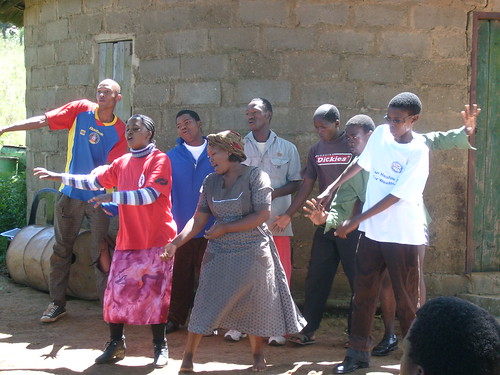
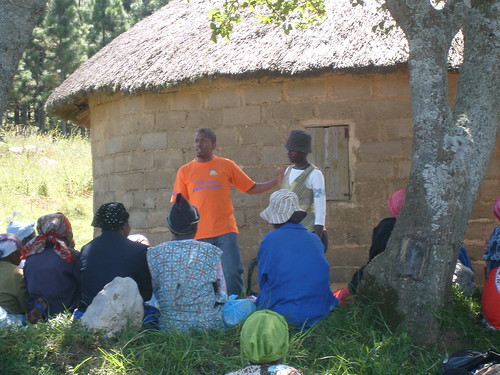
While I did live in a very rural place, I did get the chance to have fun fairly often. Generally, a few volunteers would get together on the weekend, go to a few clubs or bars, and stay at a backpackers (like a hostel). The nightlife wasn't great, but we all needed at least somewhere to unwind, especially with all the death we were constantly surrounded by. There was even the occasional concert in Swaziland. I went to one by a South African band called Freshly Ground, which was fantastic, although a little short. I also went to a world cup qualifier soccer game against Togo which ended up being Swaziland's first world cup qualifier win since 1992! The game was at the national stadium, Somhlolo, which seats 7,000 people, but 15,000 were in attendance. The crowd was nuts! I stormed the field afterward, which was really fun.
At the end of it all, I'm glad I went. I didn't make as much of a difference as I hoped I would. Despite how it may appear above, I wasn't generally that busy. No one project took up much of my time on a consistent basis. I was never given a specific assignment by the Peace Corps office there. The office had some serious issues, but that's another e-mail in itself. For the next group, they are trying something different. They are pairing up volunteers with kagogo secretaries. Kagogo centers are places set up in each chiefdom by a national organization called NERCHA to address HIV/AIDS issues in that chiefdom. Some are more effective than others; the office spoke with NERCHA to determine the most motivated kagogo secretaries in the country, although motivated is a relative term in Swaziland. I hope it works out, because our program was seriously lacking.
Despite this, it was a great experience overall. I learned so much while I was there. I learned what it's really like to live in a poor society, and to live in one devastated by HIV/AIDS. I also learned about international aid, about what is working and what is not. Aid dependence was a big problem in Swaziland, the number of people who asked me for money and candy was ludicrous. That's just scraping the surface. I also made some wonderful friendships that will hopefully last the rest of my days.
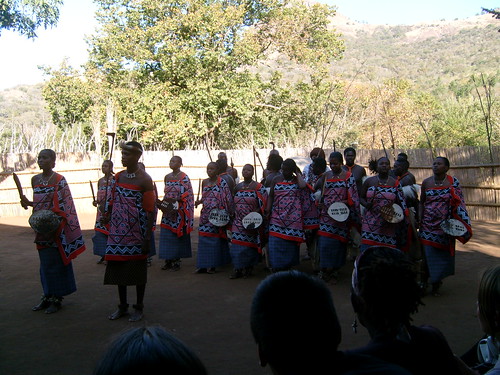
Well, that's probably enough. Thanks for reading it all. If you have any questions for about my experience, feel free to ask.
Salani Kahle (stay well),
Erik
P.S. I've been meaning to write an essay on democratic world government for awhile now, which I will probably do soon. If you're interested in that, let me know and I will send you a copy when I finish.
Tuesday, August 19, 2008
College, Politics and Iran
Among Scholars, Resistance and Resilience in Iran
Tradition of dissent survives despite government pressure
By AISHA LABI
Tehran
Reza Negahdary cuts a surprisingly visible figure at the University of Tehran for someone who has been suspended. Clad in tight jeans and a maroon T-shirt emblazoned with a glittering double-headed eagle, he has stationed himself in the central hallway of the faculty of law and political science. Thrusting a pen at fellow students, he exhorts them to demand that the administration allow for "a free, open, and absolutely democratic election" to the Islamic Association of Students, the reformist group to which he belongs.
Mr. Negahdary, an intense young man who usually has a cigarette in his hand, is barred from classes for three terms and was kicked out of the dorms but has had little problem coming and going on the campus.
In fact, he says he feels safer here than anywhere else. "Outside the university is dangerous," he says. "There are executions if people get politically active. Here, there is suppression, but you don't get executed."
Iran's image in the West has been largely shaped by its defiant, blustering president, Mahmoud Ahmadinejad, and his government's heavy-handed treatment of its citizens. Students have been arrested for their opposition politics, and scores more have been suspended. Internationally renowned scholars, like the Iranian-American Haleh Esfandiari, have been jailed. Provocative publications have been forced to close. And the morality police have upped their harassment of pedestrians on the streets of Tehran for clothing and hairstyles that do not meet the regime's definition of Islamic standards.
But as Mr. Negahdary's very visible presence illustrates, the sometimes cartoonish image of a nation oppressed, isolated, and angry fails to capture the complicated nature of Iranian society and, especially, academe.
Much of the rest of the world is trying to decipher Iran's intentions. Its political and military influence in Lebanon and Iraq, where it has backed Shiite militias, suggests that it wants to become a dominant political force in the region. Its determination to develop its nuclear program, despite international condemnation, has cemented its image in the minds of many as a rogue nation.
Iran's universities provide some insights for those who want to understand its politics. Iranians have an acute sense of national pride and see their higher-education system as the repository of a robust intellectual tradition that predates the arrival of Islam in Persia. Professors are held in high esteem, and many high-ranking government officials, including Mr. Ahmadinejad, are academics by training.
While far from unfettered, many students and professors here remain unyielding and outspoken in their criticism of the regime. And academics continue to maintain ties to the outside world, playing host to a steady stream of international visitors and traveling abroad for conferences and study.
Djavad Salehi-Isfahani, a professor of economics at Virginia Tech, left Iran in 1971 but still visits there regularly. "I am old enough to remember academic life under the Shah, and that was much, much worse," he says. "Professors were so afraid of even talking in front of students. Now is a fairly open atmosphere. The boundary has been pushed, but it is not America yet." Indeed, at times the government seems bent on making high-profile examples of some of the most outspoken activists who push too far.
Deceptive Appearances
At first glance, the tranquil campuses of Iran's universities can seem more conservative than Tehran itself. While many cosmopolitan Iranian women cover their heads with a loosely tied scarf, the black wimple-like head covering called a maghnae is usually required on college campuses and at other public institutions. And at the women's entrance to the Ministry of Science, Research & Technology, several young women are sternly pointed toward a box of tissues and a jar of cold cream to remove excess lipstick and eye shadow.
But, like the sober-hued roopoosh — the required, coatlike garment under which women wear trendy designer jeans, appearances can be deceiving: Campus activism has a long and proud tradition in Iran.
Students have played a pivotal role in social and political upheavals in Iran over the past three decades, from the demonstrations that presaged the Islamic revolution in 1979 to a wave of pro-democracy actions in 1999, sparked by the closure of a leading reformist newspaper, in which at least three students were killed and scores were arrested.
Sporadic demonstrations have roiled campuses in the past year and a half, with students protesting rising food costs and the inflexibility of Mr. Ahmadinejad's hard-line conservative government.
The government clearly views the country's 3.3 million college students as a powerful and potentially problematic political voice. Last year three students from Amirkabir University of Technology, where President Ahmadinejad had been greeted by demonstrators during a visit, were arrested for publishing statements deemed offensive to Islam in a campus newspaper. Their continued detention has sparked demonstrations that have drawn hundreds of supporters.
Mr. Negahdary, the student activist at the University of Tehran, was suspended this year for his leading role in a protest against Mr. Ahmadinejad during a campus visit last October. Students chanted "Death to the dictator" and accused Mr. Ahmadinejad's regime of corruption.
"We protested because at Columbia, Mr. Ahmadinejad said that we are the most free country in the world," says Mr. Negahdary, referring to the president's controversial New York visit last year.
Professors, too, are seen as a threat. Although the president was once a professor of traffic and transport at Tehran's Iran University of Science and Technology, he is viewed with suspicion and thinly veiled disdain by much of the cosmopolitan intellectual establishment.
The hostility is reciprocated. Soon after Mr. Ahmadinejad's surprise election victory in 2005, which he owed to the rural working class, he began speaking of the need to remove secular and liberal influences from universities. Government officials in charge of education policy echo the theme, speaking of shaping the future of Iranian higher education on Islamic precepts.
One of Mr. Ahmadinejad's first actions was to replace the president of the University of Tehran. The new leader, a senior cleric, presided over the forced retirement of some 40 professors, prompting fears of religious and intellectual repression.
Those fears were exacerbated by several high-profile firings. A professor who taught at Shiraz University was forced out after saying at a conference on the Holocaust that it could not be denied as a historical fact.
Yet while a crackdown is under way, it is not a straightforward matter of a conservative government flexing its political muscle over a liberal academic establishment powerless to resist.
The cleric who was appointed to head the University of Tehran was himself removed from office this year after weeks of student demonstrations accusing him of mismanagement.
Much like the partisan bickering between Democrats and Republicans in the United States, Iranian academics say, Iran's government is devolving into a two-wing system of conservatives and reformists. Universities, which are state institutions, reflect that division.
Conservatives are ascendant, as evidenced by some of the recent forced retirements and other personnel appointments.
"They are trying to appoint people at the departmental level to reinforce the type of environment they want and who will reorient the universities in the way they want," says Nasser Hadian, an outspoken reformist and political-science professor who has taught at Tehran for decades.
But the reformists are too numerous — and their legal protections as tenured professors too powerful — to be eliminated.
Mr. Hadian notes that three former departmental colleagues forced to retire, who he says were more the victims of longstanding interdepartmental personality conflicts than political vendettas, stand a good chance of being reinstated.
Other Pressures
The government's pressure on academics and students, although inconsistent, is having an effect.
At the University of Tehran, officials have tried, for example, to quell opposition voices indirectly by hand-selecting representatives for the Islamic Association of Students, the more reform-minded of the two main student organizations with branches on most campuses.
At Sharif University of Technology, an elite Tehran institution renowned for its science programs, members of the association gathered signatures in May for a petition denouncing a conservative group calling itself the Islamic Association of Independent Students.
The name is deceptively close to their own, says Arman Mirhashemi, a fourth-year engineering student who sat at the petition table outside a cafeteria. A purple foam Statue of Liberty-inspired head ornament barely shaded his genial, chubby face from the blazing sun.
At Sharif, he says, more students belong to the Basij Students' Organization, the campus arm of a volunteer paramilitary organization founded in 1979 by Ayatollah Khomeini.
But political activity of any kind is a low priority for most of his peers.
"In this university, students just study," he says.
Mr. Mirhashemi can afford to be more active because he almost has his degree and is now focused on applying to graduate programs overseas.
The day of Mr. Negahdary's appearance at the University of Tehran, he is joined by Roya, a first-year law student who took part in the October protests. Like many of the women on the campus she is heavily made up, ignoring the threat of the fashion police.
Roya, who asks that her last name not be printed, says her hero is Benazir Bhutto, whom she admired for her courage. But she and other female students have also had their courage tested by lurid tales of what happens to women who are arrested.
Roya's eyes, dramatically lined and highlighted by glittery blue shadow, widen as she talks about a female medical student who was reportedly raped in jail.
"Most of the girls arrested are raped in jail," she says. "Families can't cope with that."
Because of such reports, she says, she and other female students have become less outspoken and less likely to take part in future demonstrations.
Sometimes the government's attempts to control student activities can take odd forms. Mahmoud Alaci, a law student, is a member of a campus classical-music ensemble that was scheduled to perform a concert in May featuring works by Mozart, Beethoven, and other Western composers.
Mr. Alaci says the group was given permission weeks earlier and had never guessed the performance was going to be controversial. Western classical music is much loved in Iran. As anyone who has ventured into Tehran's crowded streets can attest, Beethoven's "Für Elise" is an irritatingly ubiquitous cellphone ring tone.
But the conservative regime has deemed such music to be un-Islamic, so university officials began pressing the students to change the program. The officials asked that the event include an anniversary memorial to the emancipation of Khorramshahr, a strategically important port city that was occupied by Saddam Hussein's forces during the Iran-Iraq war.
The students held the concert but ignored the request.
"We didn't mention at all what the officials asked us to say," Mr. Alaci says, noting that the event drew an audience of about 200.
It was a minor triumph, a skirmish in the continuing struggle by students to pursue their own cultural agenda, but one that Mr. Alaci is not inclined to repeat anytime soon. "It's too difficult to get all the permissions," he says wearily.
Conservatives on the Rise
The ascendance of Mr. Ahmadinejad's conservative government has also heightened tensions among students.
Conflict between reformist and conservative student groups has at times escalated into outright violence. Some students who took part in the October protest say that students affiliated with Basij, the volunteer paramilitary group with roots that go back to Ayatollah Khomeini, helped the authorities beat them back.
"They took part in the crackdown," Mr. Negahdary complains. "I was sentenced because of a violation of law and order, but when the Basiji do the same thing in support of the government, they never get this kind of sentence."
Mohammad Jafari, a slight, bearded young law student affiliated with Basij, says the group represents an effort to develop moral values and solidarity independent of Western influences.
"We believe Iranian society has to get ideas and policies from Islamic society," he says. Portraits of the current supreme leader, Ayatollah Ali Khamenei, are ubiquitous in public buildings and loom over even the most unprepossessing offices, but the relatively small one that hangs on the wall of the otherwise sparely adorned student Basij office has special significance. The group defines itself by its special commitment to the supreme leadership, Mr. Jafari says.
The group's more radical tendencies are just one part of its identity, though. One May afternoon, on an outlying campus at the University of Tehran, female members of Basij gathered to meet a special visitor.
It was the anniversary of the liberation of Khorramshahr. The widow of a soldier killed during the siege — considered a martyr in Iran — had come.
Sara Muhamad Kamal, an elementary-school teacher and graduate of the university, organized the session. The group's activities, she says, include arranging conferences and panel discussions related to martyrdom and social outreach to help the poor. She cuts short a conversation as the widow enters the room, her chador and the others swirling in unison as the women rise excitedly to greet their guest.
Attention to Academics
Their political passions notwithstanding, Iranian students, like students anywhere, remain largely consumed with their courses.
That's not surprising, perhaps, given that securing a spot at one of the country's leading universities is the goal of every ambitious young Iranian.
Families that can afford to do so enroll their children in prep courses to boost their chances of landing a berth at an elite institution, and posters for those classes are ubiquitous along the traffic-choked streets of Tehran.
In a classroom a few doors down from the Basiji women's office, the lectern behind which Pooya Alaedini, a professor of social planning, is standing bears a boldly lettered graffiti slogan in English: "The more I make love, the more I want to make REVOLUTION."
The students are oblivious to the incendiary statement, which looks as if it has been there for quite a while. All instead focus intently on the equations Mr. Alaedini is scribbling on the whiteboard.
Mr. Negahdary, the suspended activist, believes that despite the apparent apathy of many Iranian university students, revolutionary fervor lurks just below the surface on most campuses. The conservative regime thinks so too, he says. "The government is afraid of the students, that if they come out of the dorms, it will provoke wider protests in the streets," he says. With students like Mr. Negahdary and academics determined to express their views, Iran's universities will remain the centers of activism and opposition politics they have always been, despite the regime's efforts to silence the most troublesome voices.
http://chronicle.com
Section: International
Volume 54, Issue 47, Page A1
Monday, August 18, 2008
Is College a Waste of Time?
First, we will set up a single goal to represent educational success, which will take four years to achieve no matter what is being taught. We will attach an economic reward to it that seldom has anything to do with what has been learned. We will urge large numbers of people who do not possess adequate ability to try to achieve the goal, wait until they have spent a lot of time and money, and then deny it to them. We will stigmatize everyone who doesn't meet the goal. We will call the goal a "BA."
You would conclude that your colleague was cruel, not to say insane. But that's the system we have in place.
Read it here:http://online.wsj.com/article/SB121858688764535107.html
Thursday, August 14, 2008
Professor Weinberger profiled by Foreign Affairs
http://www.foreignaffairs.org/arp/newsletter/current.html
Wednesday, August 13, 2008
Internship Opportunity: Cascadia
Contact information is available on their website, www.cascadiaproject.org. Contact name would be John Earling or Elizabeth Churchill.
Local campaign seeks workers
David Sawyer
Campaign Manager
Friends of John Ladenburg
www.Ladenburg.org
253.678.2276
Students, be a mentor
New middle-school mentorship program on East Side
As Elliot Stockstad sees it, mentorship programs are one of the best ways to provide positive role models for students. Organizations like Big Brothers Big Sisters do a masterful job, he said, at helping elementary and high school students. But middle school students, he said, often don't have the same opportunity.
A new program, Mentor253, hopes to fill that gap – at least on Tacoma's East Side.
Launched by the Northwest Leadership Foundation last fall with the help of a grant from the U.S. Department of Education, program organizers hope to match 150 students at Gault and McIlvaigh middle schools with mentors by the end next year.
So far, 30 students have been matched with mentors. Twenty others – 10 kids and 10 adults – are going through the required background check and should be paired by the start of the school year.
"After that, eventually, I'd like to see every middle school student matched up with someone," said Stockstad, the program's program director. "I realize that's kind of lofty and maybe unrealistic, but that's what I want to do."
But Stockstad, who spent seven years as a counselor and executive director of Sound Youth Counseling, said he hopes to have 90 matches by the end of next month.
A part-time site coordinator oversees the program at each school and sets up activities, like sports or arts and crafts. All activities take place on school grounds.
Organizers are targeting college students and young professionals to be mentors, but the list includes people from myriad backgrounds, like an English teacher at Mount Tahoma High School and a poker dealer at the Emerald Queen Casino.
Stockstad, the program's only full-time employee, also hopes to establish an honorary mentor program, where prominent members of the community who don't have an hour to spare once a week can still lend their name to the cause.
Julia Garnett, the corporate giving manager at Russell Investments, signed up to be a mentor last spring. Her job responsibilities at the investment firm include researching various charitable programs; when she learned about Mentor253, she signed up.
She and her student, a soon-to-be eighth grader at McIlveigh, only met a few times before summer break, but they played tennis and computer games and made collages.
Garnett was also there to just listen and give advice.
"It's a pivotal place where people can invest their energies to make a change," she said. "I've seen programs where kids are provided with a safe place and someone to talk to, and I've seen it make a difference.
"Evidence points to these programs making changes too, but I've seen it myself."
Friday, August 01, 2008
International Youth Leadership Conference, Prague
17th International Youth Leadership Conference
January 4th – 9th, 2009
Prague, Czech Republic
Join prominent university students from 40 different countries for an experience of a lifetime!
The theme of the conference is “a cross-cultural exchange of ideas concerning the future of world leadership” and the main objective of the IYLC is to blend educational activities and social interaction using a number of inter-related events, such as:
* Simulation of the United Nations Security Council Emergency Meeting
* International Criminal Court Mock Pre-Trial
* Model European Parliament Proceedings
* Visits to foreign embassies, Senate of the Czech Republic, European Commission, Radio Free Europe/Radio Liberty, PricewaterhouseCoopers
* Group debates and panel discussions on international security, environmental sustainability, rule of law, responsible leadership and mass media
* Meetings and banquet dinners with leading experts, diplomats, politicians and businessmen
For more information and application, please visit www.CzechLeadership.com.
Apply early to take advantage of the Early Bird discounts:
20% until August 25th, 10% until September 20th, 5% until October 10th
---------------------------------------------
Yours faithfully,
Ismayil Khayredinov
ismayil@civicconcepts.org
Conference Director
17th International Youth Leadership Conference
Civic Concepts International
www.czechleadership.com
tel: +420 272 730 897
Internship: World Trade Center
Interns are asked to work 15-20 hours per week, and are unpaid. We are flexible to work around student class and work schedules. There are positions available in event coordinating, international trade services, and website design. Interested students are asked to submit their resume, cover letter (indicate which intern position you are interested in and your schedule availability), a letter of recommendation, and also a school transcript if you are interested in receiving academic credit for your internship. For more information about intern positions, visit: http://www.wtcta.org/index.php?CURRENT_PAGE_ID=521.
All application materials and questions about internships can be sent to Darren Brewster at dbrewster@wtcta.org.
